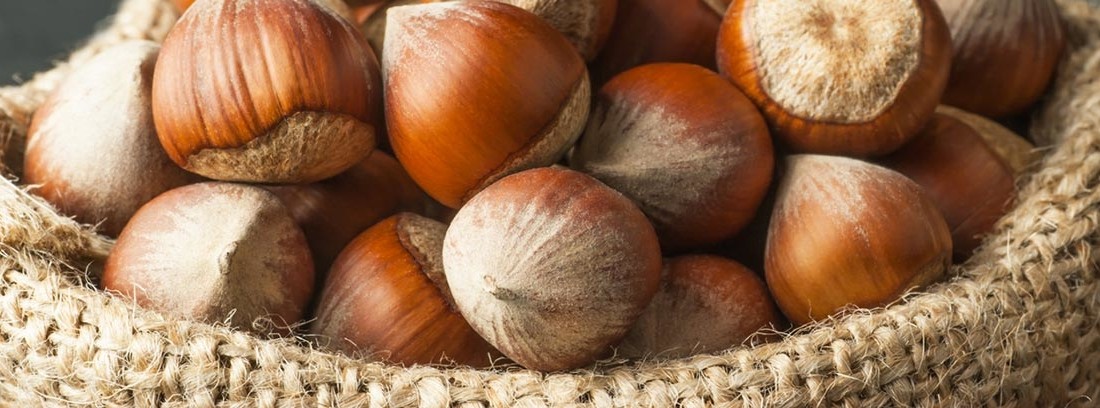Hazelnut nutritional benefits

Hazelnut is a very interesting food that can be part of our usual diet, without this having to lead to weight gain.
Nutritionally hazelnuts are high fat foods, especially monounsaturated fatty acids, fiber and protein. They are also rich in micronutrients, providing us with good amounts of magnesium, potassium, calcium, vitamin E, and folic acid.
Monounsaturated fatty acids
First of all, we must bear in mind that the fats that hazelnuts provide us are fundamentally unsaturated fats, especially monounsaturated, which are the most interesting from the point of view of cardiovascular care. Specifically, between 77 and 80% of the fatty acids in hazelnuts are of this type.
Potassium
Very present in hazelnuts and basic in our body since it covers fundamental functions such as facilitating the nerve conduction and contraction of smooth and skeletal muscle, including the heart, as well as the functioning of the cell membrane and various enzyme systems.
Calcium
We often need to look beyond dairy, especially for vegan or allergy sufferers. Hazelnuts contain about 194mg of Calcium per 100g (among the foods richest in Calcium). Calcium is part of bones and teeth, but it also has regulatory functions as a messenger inside cells.
Magnesium
Magnesium is responsible, among other functions, for maintaining proper functioning of the muscles and nerves, also participates in the regulation of cardiac contraction and supports a healthy immune system.
Vitamin E
Hazelnuts also contain vitamins that provide us with very interesting functions. Has it antioxidant functions, protecting body tissues from damage caused by free radicals. It also participates in the formation of red blood cells and helps keep the immune system strong.
Folic acid
Vitamin B9, involved in cell multiplication, is involved in the production of red blood cells and in the development of the nervous system.
Fiber
They are rich in fiber, therefore and due to their fat content, they contribute to generating a remarkable sensation of satiety. Fiber contributes to improvement of intestinal transit and in the West, a higher fiber intake is related to a healthier lifestyle.
4 Health benefits of hazelnuts
- For endurance sports, hiking and mountaineering: as hazelnut is a small food, it weighs little and provides us with great nutritional density, it is one of the things that is worth carrying in the backpack when we are doing endurance tests, mountain tours or mountaineering. They will provide us with a large amount of potassium and magnesium, very interesting for replace losses due to sweating and muscle wasting. Also vitamin E, with antioxidant properties.
- For situations of constipation: the fiber and fatty acids of the hazelnut will contribute to the improvement of intestinal transit, making them an interesting food for those who suffer from constipation problems. We must bear in mind that we are going to ingest the highest fiber content when we eat them raw with their skin.
- For vegan peopleHazelnuts in particular are always a good idea when it comes to finding nutritious foods. In the case of vegans in which the lack of dairy intake can compromise calcium requirements, hazelnuts can contribute in a good way to rebalance the diet by contributing to calcium intake.
- For pregnant women and children: These small balls are usually well accepted by children and are a very nutritious food that is easy to take as breakfast or a snack, taking into account that in very young children they must be chopped or shredded. In pregnant women they can represent another source of folic acid essential for the development of the neural tube of the fetus.
When is it not advisable to take them?
- In babies and boys and girls under three years of age: what we will have to avoid in these cases is the intake of whole hazelnuts, for the choking risk. However, their intake if they are ground or chopped very tiny as part of other preparations, for example, they do not entail any problem.
- In people with dental problems: in this case it happens a bit like with babies and small children, a person will not be able to chew hazelnuts correctly, and this can lead to bad digestions and risk of choking, especially in elderly people who also have symptoms of solid dysphagia.
LITTLE GREAT FOOD
- Hazelnut, like most nuts, is a food with high energy density, but it also contains an interesting amount of fiber that plays fundamentally two roles: providing an important feeling of satiety and slowing down and hindering the absorption of certain nutrients. a fact that contributes to reducing the caloric potential of these small fruits.
- Season: hazelnuts are typical autumn fruits, although they begin to be full at the end of July, as the saying goes: "for Santa Magdalena (July 20), the hazelnut is full".
- Profits: its content of monounsaturated fatty acids, vitamin E with antioxidant properties and fiber makes hazelnuts a heart-healthy fruit.
- Ideal for: they are easy to transport and very nutritious so they are very good to carry with you, on a mountain excursion ...
Diploma in Human Nutrition and Dietetics Bachelor of Food Science and Technology
(Updated at Apr 14 / 2024)